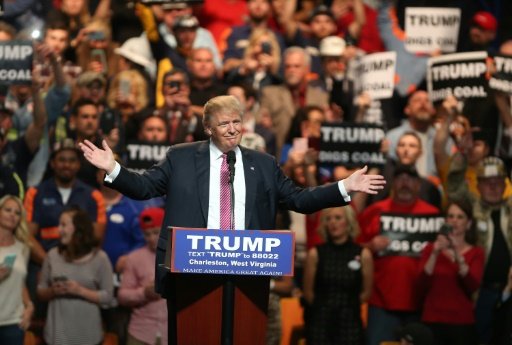
Republican Presidential candidate Donald Trump speaks on May 5, 2016 in Charleston, West Virginia, by Jim Mannion | AFP
WASHINGTON: Voters in West Virginia and Nebraska cast ballots in White House primaries Tuesday as a new poll showed presumptive nominees Hillary Clinton and Donald Trump neck-and-neck in three key battleground states.
Clinton still has active competition for the Democratic nomination despite her virtually insurmountable lead in the delegate count, and rival Bernie Sanders was looking for a big win in West Virginia.
Trump is now alone in his quest for the Republican nomination, his last two rivals — Texas Senator Ted Cruz and Ohio Governor John Kasich — having dropped out after the New York billionaire’s blowout victory in Indiana last week.
A Quinnipiac University poll out Tuesday showed Trump rapidly closing in on Clinton’s lead in two major battleground states — Florida and Pennsylvania — and overtaking her in swing state Ohio.
No candidate has won the presidential election without taking at least two of those three states.
“Six months from election day, the presidential races between Hillary Clinton and Donald Trump in the three most crucial states — Florida, Ohio and Pennsylvania — are too close to call,” said Peter Brown, the poll’s assistant director.
– Unyielding Sanders –
The poll also found that Sanders, a democratic socialist who commands an enthusiastic following on the left, would do better against Trump than Clinton in all three states if he were the Democratic nominee.
The 74-year-old Vermont senator, who defeated Clinton in Indiana last week, has mounted an unyielding come-from-behind challenge that has exposed weaknesses in the former secretary of state’s campaign.
Although almost certain to win the Democratic nomination — she is only 155 delegates short of that goal — Clinton’s ability to excite young and white working class Democrats going into the general election has been put in doubt by Sanders’s primary successes.
In West Virginia, a coal mining state in the heart of Appalachia, Clinton shot herself in the foot in March, telling voters in neighboring Ohio: “We’re going to put a lot of coal miners and coal companies out of business.”
She later apologized and suggested her remarks were misunderstood, but in a state where livelihoods have hinged on coal for generations, many are unconvinced.
Recent polls show Sanders with as much as a six-point lead over the 68-year-old former first lady among Democrats in the state, where 29 delegates are up for grabs.
Polls opened in West Virginia at 6:30 am (1030 GMT) and close at 7:30 pm (2330 GMT).
In Nebraska, polls opened in the Republican primary at 8:00 am (1300 GMT) and close at 8:00 pm. The Democrats caucused there on March 5, and Sanders won.
– Trump challenges –
While Clinton still has Sanders to worry about, Trump faces a rebellion within the Republican leadership over the insulting tone and shifting substance of his candidacy.
House speaker Paul Ryan in the past week announced he was “not ready” to support Trump, a rare rebuke that put the power struggles underway within the Republican party on public display.
In the same week, former presidents George H.W. Bush and George W. Bush and 2012 Republican presidential candidate Mitt Romney announced they would not attend the party’s nominating convention in Cleveland in July.
The Republican establishment is still reeling from Trump’s hostile takeover of the party, aghast at positions he’s taken on trade, foreign policy and taxes that fly in the face of conservative dictums.
But Trump has shown no sign of backing down, reportedly moving instead to assert control over the Republican National Committee’s fundraising and political organizing infrastructure.
According to The New York Times, Trump has said he may need as much as $1.5 billion for the campaign ahead, and will seek to raise it from donors rather than to self-finance as he has up to now.
Meanwhile, he has given New Jersey Governor Chris Christie the task of planning a transition to a Trump administration, including searches for future cabinet secretaries.
Already on board the Trump train is former Texas governor Rick Perry, an early dropout from the Republican race who endorsed the 69-year-old real estate mogul last week.
“I full well expect the Republican party to fall in behind Donald Trump to help him get elected, because again, the alternative here is very, very different,” Perry said in an interview Tuesday with CNN. -AFP
